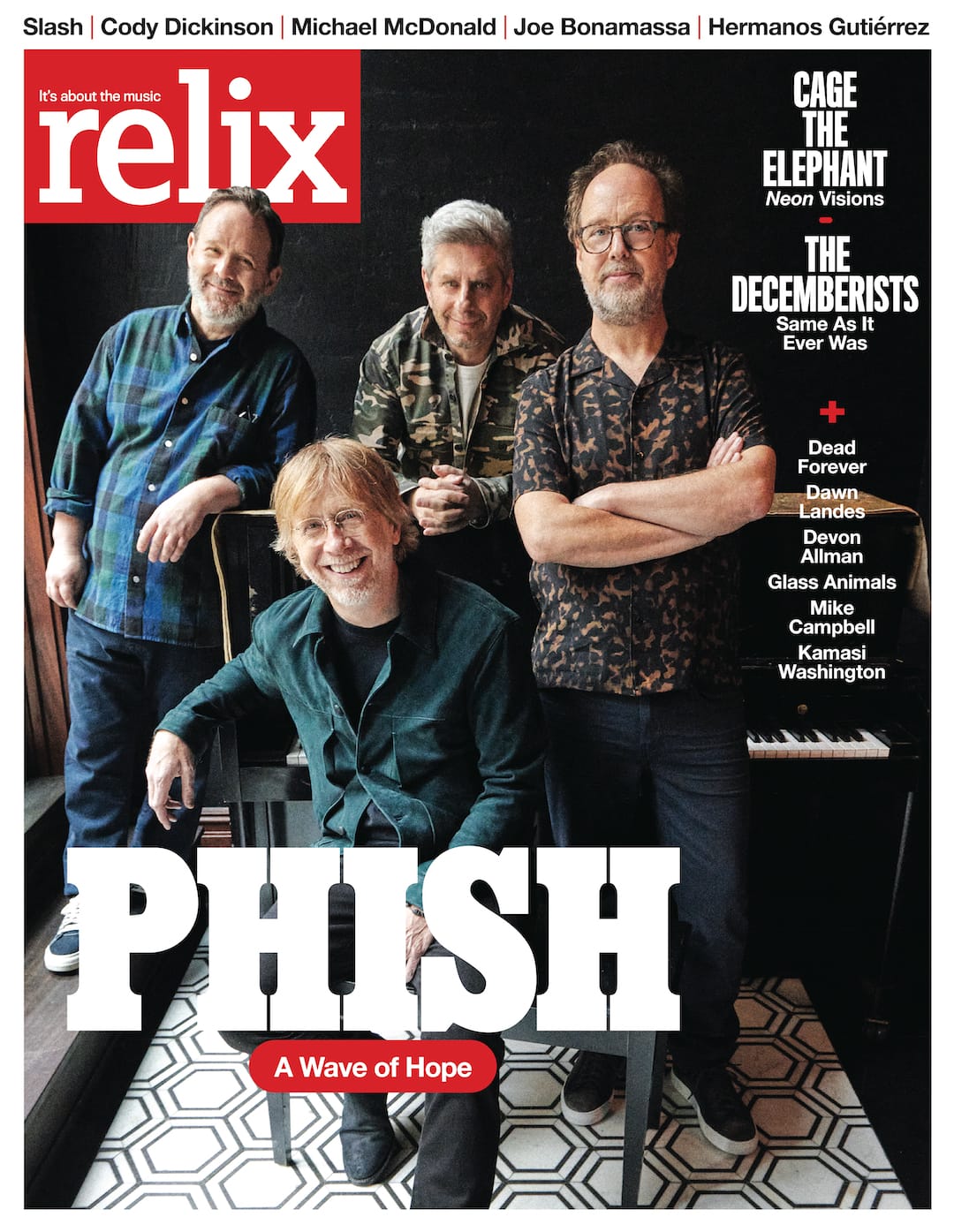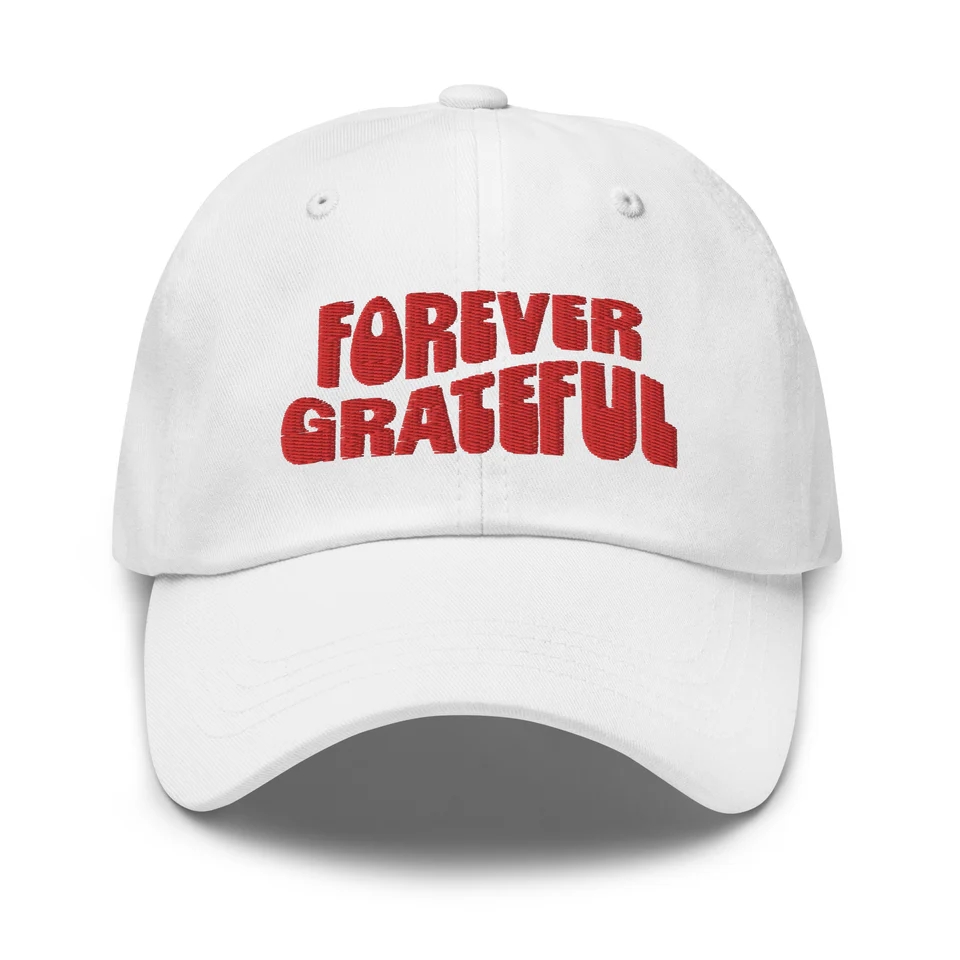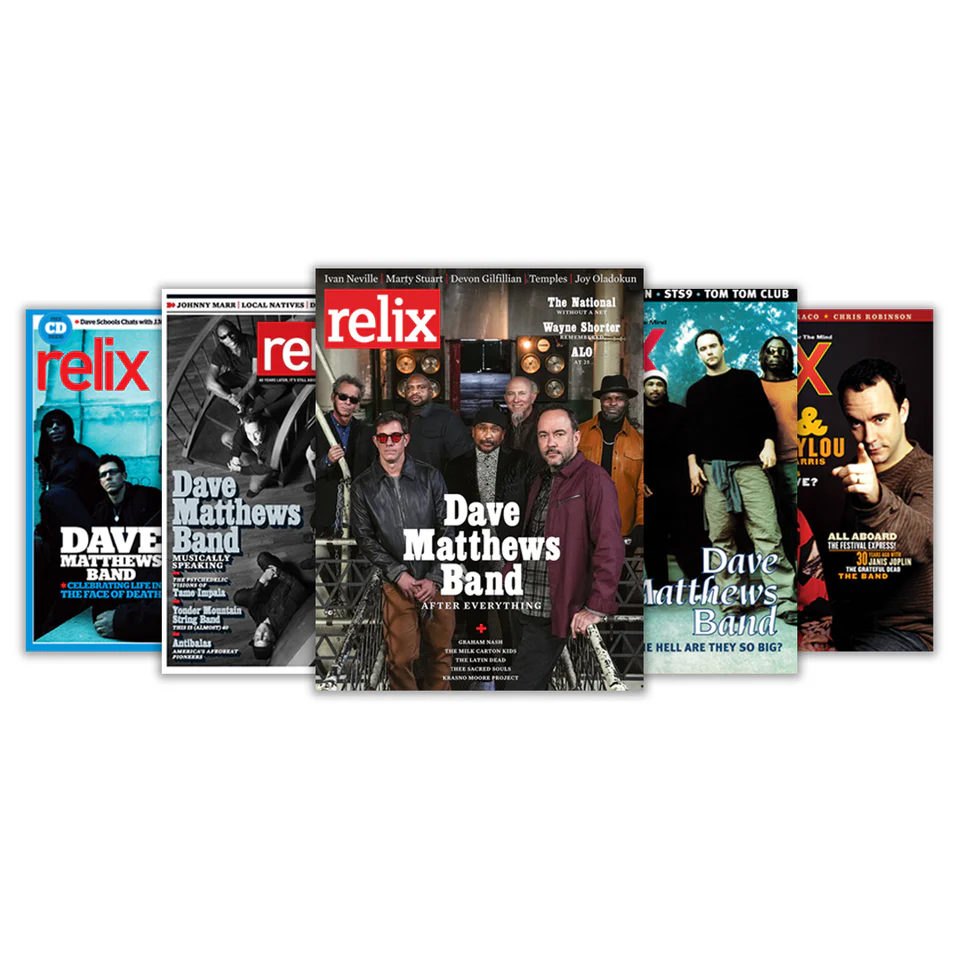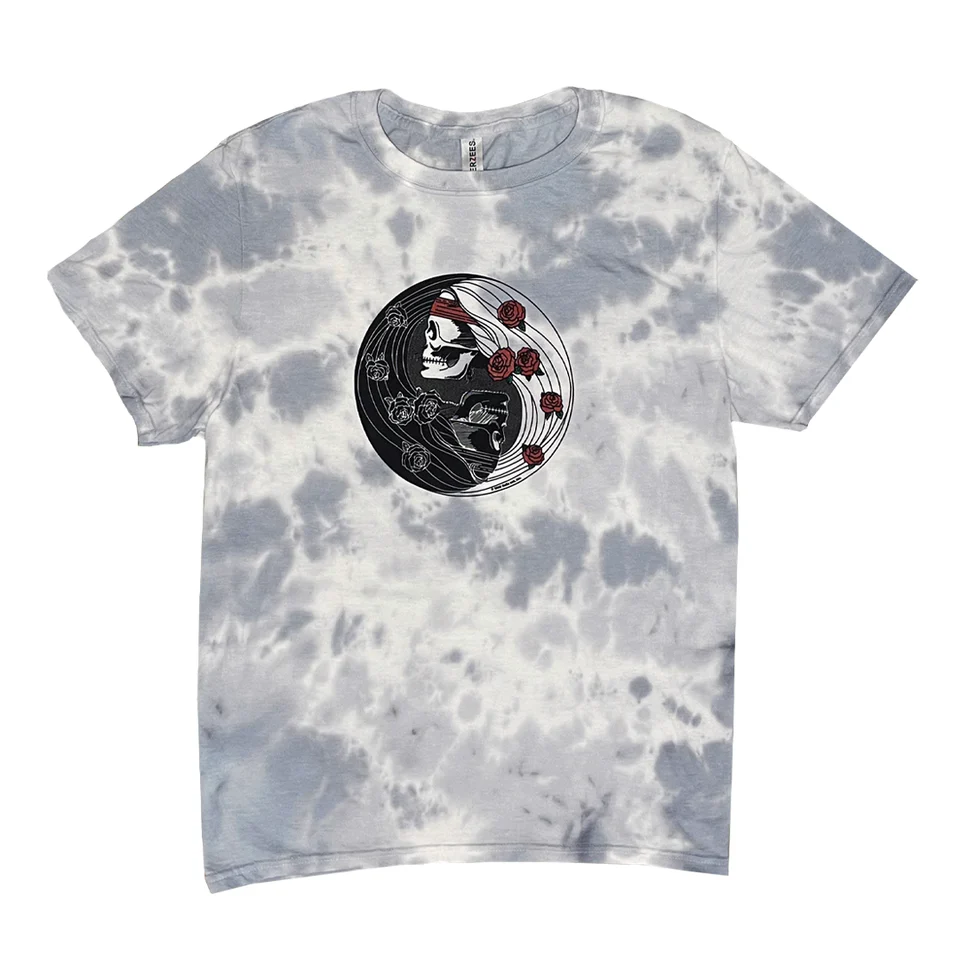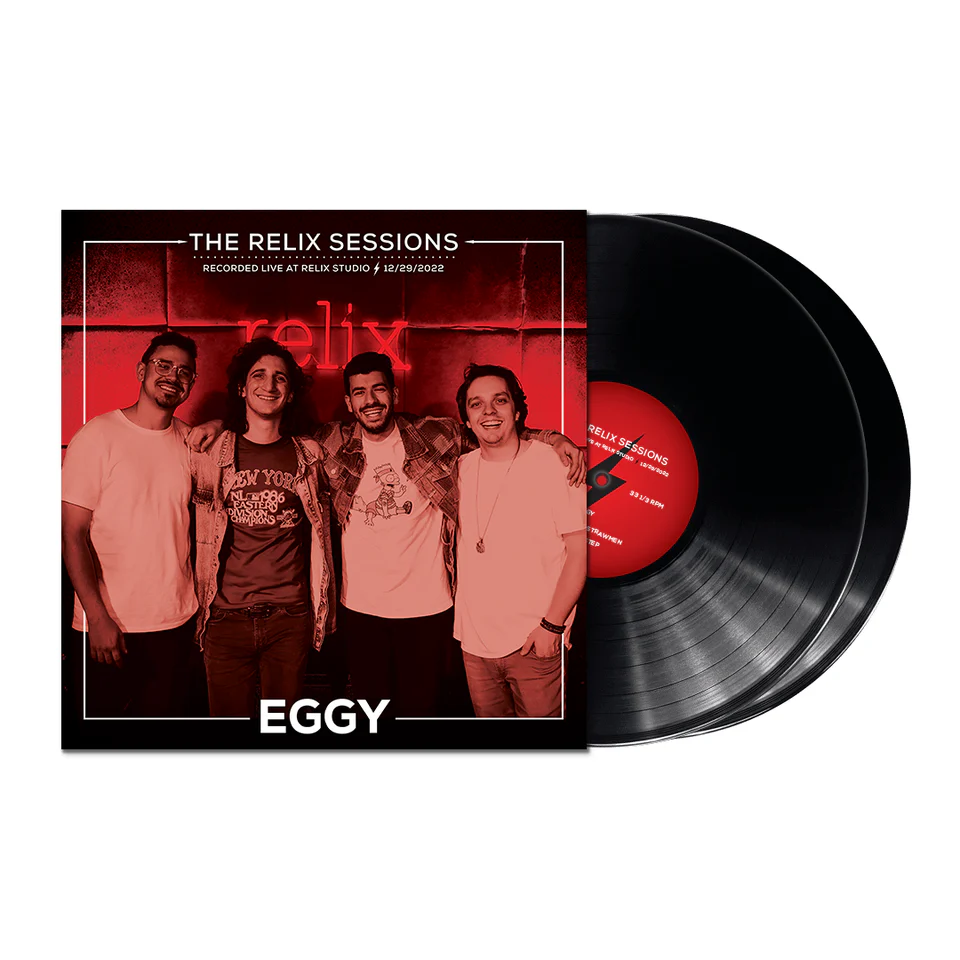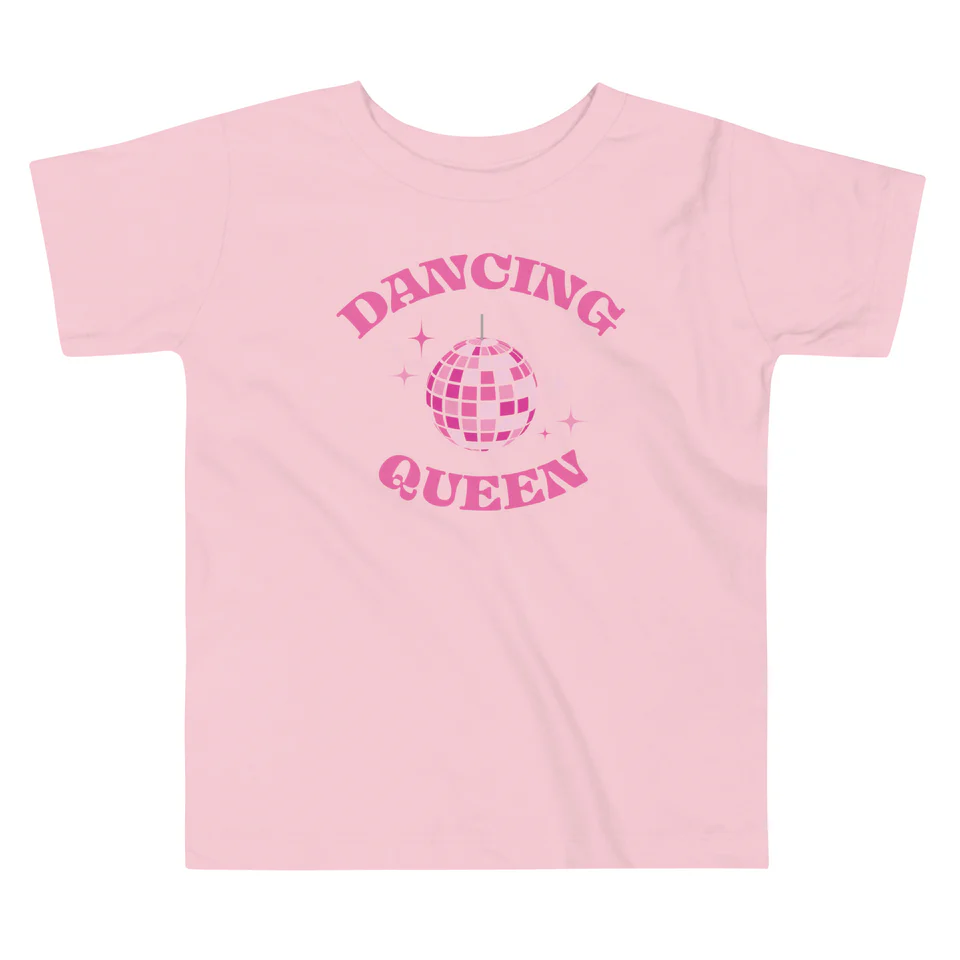Finding ‘Mercy’: Trey Anastasio on Songwriting

photo credit: Jake Silco
***
Trey Anastasio’s new solo acoustic album, Mercy, is an intimate account of what he experienced within his New York City apartment during COVID. It’s a deeply personal record and, yet, it’s also one he doesn’t entirely understand.
“When I listen to it now, there are moments when I don’t even know what I’m talking about or who I’m talking about,” he reveals. “This album came together during Omicron, and I don’t think I’ve ever spent so much time indoors without looking at the horizon. It was kind of messing with my head.”
“Many of those songs have gotten more confusing to me over time, which scared me a little bit,” Anastasio continues, “but then I read this quote from the author Carlos Fuentes. He said, ‘I don’t think any good book is based on factual experience. Bad books are about the things that the writer already knew before he wrote them.’ And that just struck me like a lightning bolt, in terms of what just happened with a couple of the songs on Mercy. I feel like the record is incredibly honest but what I thought I was writing about when I started writing is not where it went. That’s because the door was so open from daily writing and just letting go.”
Anastasio recently demonstrated his approach to songwriting through a video series on Instagram. With a stated goal of demystifying the process, he invited fans to observe the evolution of a song. Beginning with a five-minute journaling exercise—jotting down images initially evoked by a Jim Pollock sculpture—Anastasio developed a tune over three days. He originally titled it “Reborn in the Steam,” drawing some inspiration from the 2006 documentary Deep Water, which is about the 1968 round-the-world solo boat race. The song eventually became known as “Machine,” touching on general themes of surveillance and escape.
“Songwriting is the thing that gives me the most joy in life,” he says. “And it’s similar to improvising. I don’t want to know what I’m going to play when I go out onstage. I just want to go out there and make it up.”
***
You recently shared a number of videos on Instagram that offer your perspective on creating music. In part three of the songwriting series, after renaming your song “Machine,” you observe how cellphones have eliminated solitude in modern-day society. At that moment, I said to myself: “Maybe the machine is your phone” and, about 15 seconds later, you said, “Maybe the machine is my phone.” I imagine that plenty of other people had a similar experience. What do you think that says, if anything, about the process?
This is a good place to start a conversation about songwriting. The fact that we both thought that at the same time points to something that’s at the essence of songwriting for me.
It has always been an organic thing. And the fact that we thought of that at the same time reminds me that, while 80- 90% of my songwriting since day one has been written alone, inspirational moments have been in teams.
Songwriting, to me, is not that different than improvising. So the more you get your hands off it and get out of the way, the easier it is.
I’m so glad that you had that experience because I write every single day. I don’t separate it from anything else. It’s just in the fabric of what I do.
It doesn’t feel like I’m really doing anything because I don’t separate songwriting from everything else. It’s not some magical gift that belongs only to songwriters. For me, it’s the same as having a conversation. Even when I’m alone, it still kind of feels like that.
I can think of so many times over the years when I’ve experienced that with the band members in Phish or with Tom [Marshall] or with my friend Captain Kevin or Susannah Goodman or anybody else that was in the room while I was writing.
You had that thought at the same time I had that thought because it was in the air. That wasn’t a me thing, that was an us thing. We were both like, “Oh, maybe the machine’s the phone. I thought the machine was a sailboat.”
Then, the struggle is not getting caught up in your editor brain during that creative period. Say yes to life.
In that Instagram series, you introduce a number of phrases and concepts that inform your songwriting process. One of my favorites, which is applicable in many other contexts, is “This is so good it should be even better.”
That’s one of three or four sayings that I have tattooed on my brain. The first one is “This is so good it should be even better.” I have to thank my composition teacher for planting that in my head when I was 18. Another one is “Maybe it’s time to start using the other end of the pencil.” I love that one.
I’ll tell you a story that I heard from one of the guys in the Eagles about songwriting. He said that he lived in an apartment next to Jackson Browne when they were like 20 and he learned how to write songs from Jackson Browne. The walls were thin and, every morning, he would be making his coffee, and he would hear Jackson Browne playing songs for hours through the wall.
There’s that song “Doctor My Eyes” and he would hear, “My eyes, my eyes, my eyes…” Then, the next day, maybe he’d hear, “My eyes, doctor my eyes, something needs to be fixed with my eyes. I need to fix my eyes…” It was the same song and then, a week later, it would be “Dentist my eyes…” or something like that. [Laughs.]
But the way that he was approaching it was not by beating it into submission. It was like, “This is so good, it should be even better.” It was a gentle kind of love.
That is what I find myself doing, and I think I’m getting better at it. If you do it a lot, it’s like a muscle and you don’t panic. You kind of wake up in the morning and see where it takes you.
An example of this is a song that I wrote called “A Life Beyond the Dream.” It was called “A Light Beyond the Dream” for one or two months, but it didn’t feel quite right to me. I asked myself: “What is this?” But I didn’t stare at it. I played it a lot, though. I have 10,000 versions of me playing that on my phone, over and over again—not like it was work but because there was something about it I really liked.
Then, there was this moment where I was singing, “I can see a light beyond the dream,” and I asked myself: “How come I always sing about this light thing? What is this? What is it trying to say?” I don’t say me. It’s not “What am I trying to say?” but “What is it trying to say?” What is the song trying to say?
Then, I was over at Fish’s house one day and I started teaching it to him because he was gonna play on Ghosts of The Forest. At that point, I was starting to go back and forth between light and life. I was gently singing it out loud with him in the room and he heard it and was like, “Oh, that’s so cool.” Then, he said something about this Native American philosophy that resonated with him while I was playing it—the idea that this is the dream that we’re living and all these struggles that we’re having.
It tipped at that point. That was when it solidified itself as life.
I was in my living room a few days later and I understood what I was singing about, at least for me. That’s when I added, “Now, I’m letting it all roll by because I can see a life beyond the dream.” Then, one day without thinking, I started going, “Don’t give up hope, keep dreaming. Don’t give up hope…” And the song completed itself.
The reason I’m telling you this story is it’s very similar to what you said about the machine moment. Even though you weren’t in the room with me, you had it and I had it. I wasn’t pushing that agenda. I was getting out of the way of the agenda.
The way I think about songs is almost the way that I think about having children. I think we’re lucky that a child’s spirit gets to pass through us as parents, but that’s not my spirit.
You and I both have kids and their spirits passed through us. What an honor that is. I’m really serious about it.
And that’s what songwriting is like for me.
That reminds of this Joe Henry quote about songwriting where he said, “I’m not big on writing as self-expression. I write for discovery; I write to find out what I’m writing about.”
Yes, and it’s kind of always been that way for me. Even if I’m writing in a team, I’ve always been attracted to the fact that the push and pull seems to open up doors in a healthy way because we’re connected. We’re not free-floating molecules. We’re part of something bigger and, sometimes, that makes it even easier for the doorway to open.
I’ll give you another example of a song where I feel like that’s true. There’s a song in the TAB repertoire called “A Case of Ice and Snow.” [The song appears on 2006’s Bar 17.] I was with my friend, Kevin Hoffman, who plays piano. He hasn’t written songs by himself but he has a couple of songwriting credits with me: “Burlap Sack and Pumps” and “A Case of Ice and Snow.”
There’s another credit in there. If you look at it, it’s credited to Anastasio/Hoffman/ Cruz. And John Cruz is a great songwriter from Hawaii. He wrote a beautiful song [“Island Style”] that goes “On the island, we do it island style/ From the mountain to the ocean from the windward to the leeward side…” He’s a great songwriter, and I had never even met him before. But, we were in some late-night thing where we all ended up in a room together and I was walking around playing this guitar. It was kind of a late, crazy night during a difficult time for me.
I remember this being a similar experience to what you’re talking about. I was singing, they were both in the room and I think they each threw in a few words. I actually remember the line that John threw in. It was three o’clock in the morning, I was scared about what was happening in my life and I think the line that John suddenly said was “Summer, sunshine time to grow.” And that went into the air with the narrative of this song.
So we wrote a song together. I don’t think he even knows he’s credited on that song. He might get a check for like $1.16 every couple years or so, but I don’t think he has any idea. We weren’t working at accomplishing something. We were just living.
That’s because of the way I was introduced to songwriting, which is that songwriting for me was my social life starting around fifth grade. It certainly wasn’t gonna be a path of life. It was a genuine escape from life. It was my place of joy.
So I’ve been writing songs for pretty much my whole life. I actually remember first writing songs for joy when I was in third grade.
Before you wrote your first song, did you hear one that suddenly altered your relationship with music and the way you envisioned songs?
It was West Side Story. My mom gave me a little red record player—I must have been in second or third grade—along with two albums. One was West Side Story, the original cast soundtrack. The other was an early Jackson 5 record. It had “Goin’ Back to Indiana” on it and “Do the Funky Chicken” [“How Funky Is Your Chicken”]. She taught me how to put the needle down and I used to dance around my room.
I remember very clearly listening to West Side Story over and over again, obsessed. I’m still obsessed. It was like the door opening for me, there’s no question. And all of that theatricality in early Phish came from that—the soaring melodies and the attempt to try to do something deeper harmonically and combine those things. Whether it’s “Divided Sky” or “Foam,” it all came from West Side Story.
When I heard the end of West Side Story, it scared me. I remember being young and, at the very end—when he gets killed—the two themes come in on top of each other but the harmony changes underneath and it gets really sad. They’re playing a tritone in the bass—I didn’t know what that was at the time, but it used to scare me. Why is it so sad this time? They play the same theme but it’s re-harmonized. He’s dead now and the ending never resolves.
I’m still obsessed. I won’t watch the movie because I’m afraid I’m going to hate it. It already was perfect.
But I had that and I had Michael Jackson—tiny little Michael Jackson—who told me that you could be young and do this. I thought that all eight year olds could sing like that. [Laughs.]
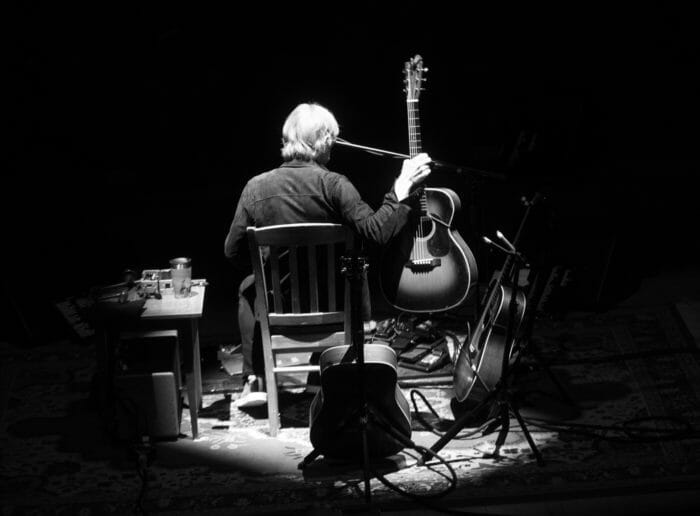
Was there something specifically that led you to believe that you could write a song?
I have to give an enormous amount of credit to my mom who is so creative. My mom’s a writer and my grandmother was a writer. So I was told from birth that the way to live life was a creative life. That’s an important piece to the puzzle. My mom has written 250 books. We made a board game together, it was called Climb a Rhyme—my grandfather Cle was an artist and he did the art. My first paying job was co-writing children’s songs with my mom. We got $250 a song and she took half and gave me half.
So I was given a full helping really early on of “write your own song.” I grew up with the message: “You like ‘The Firebird?’ Write your own ‘Firebird.’” My mom was incredibly creative; she remains so, and I’m very grateful for that. The older I get, the more I can see how lucky that was.
I can still remember the first song I wrote when I was in third grade. My cat was named Fagin and it’s called “Fagin Ate My Gym Suit.” I could sing it to you, that’s how well I remember it.
There was not one shred of doubt in my mind that you could just do it yourself. Why not just do it yourself? I had bands right away but I was also writing in my room. I’m still writing in my room. I wrote in my room today. I still get so much joy out of that.
But I’m not in the results business. It’s not something to achieve, it’s about the sense of discovery. It’s about the dopamine blast from another chorus or another rhyme.
It’s something I love sharing with my friends. I’ll be talking to Page and say, “Let’s go make a record.” Or we’ll create something like Sci-Fi Solider or Kasvot Växt.
Oysterhead was the same thing. My contribution to Oysterhead was I said, “I will only play with you guys if we go to the Barn and write an entirely new album. We have one month. We’ll walk in, write it, record it, mix it, master it and walk out. That’s it. I don’t even care what it’s about.” So when I was asked if I would do it, I said, “Yes, if it’s all original and we walk in and come out with an album.”
I only wanted to do the Ghosts of the Forest tour if it was all new music—all original.
The 8 Foot Fluorescent Tubes came about when Kevin Statesir asked me if I would open Higher Ground the first weekend. I said, “Only if you let me do an entire night of all new music with a new band. We’ll walk in, we’ll write and we’ll be done two weeks later.”
Co-writing is even more fun. People are always like, “Is it one person who does the lyrics?” I’m like, “No, it’s co-writing. Everything’s wide open. You’re collaborating.”
What’s “Wombat” about? I don’t know. It’s about what happens when the four of us are sitting on a couch together. [Laughs.]
Now, sometimes that can be a little too silly but I think in your own mind—in your relationship with the song— you can still have that same open tube.
I read an interview with St. Vincent, Annie Clark, a songwriter I appreciate very much, where she said, “Writing a song is like getting hit by a train, but you don’t get hit by a train unless you hang out on train tracks all the time. You can’t be in your apartment and get hit by a train.”
I was like, “Boom! A hundred percent!” She hit it on the head. That’s exactly what it’s like. And if you get too tunnel-vision or micro-vision about hammering your song into submission, it’ll never work.
That’s why I try to write lots and lots of songs at once. I keep a completely open mind, and certain ones just fall away while other ones kind of come up. You have to let them speak to you.
Now, I’m not claiming to be the best songwriter of all time. Other people probably have different methods. I’m just sharing the way I look at it.
But I can tell you that it’s the part of the day I can’t wait for. It saves me, when the rest of life becomes difficult to deal with.
The Annie Clark quote reminds of something that E.L. Doctorow once said about his creative process: “Writing is like driving at night in the fog. You can only see as far as your headlights, but you can make the whole trip that way.”
He was really onto something. Being in a band has led to a couple of moments where a long jam emerges that was completely in the moment and improvised, but in the rearview mirror it looks like it has an inherent logic.
Then, I think about one of my all-time favorite musicians, Mr. Brian Eno, who was probably my greatest hero with some of the work that he did. I want to mention Eno first in his work with the incredible David Byrne on My Life in the Bush of Ghosts. There’s also Remain in Light, which was Talking Heads, but it was Eno. That was Eno’s thinking and mentality, the whole “stop making sense” mentality— which ended up making more sense than when they tried to make sense. When they tried to keep not making sense later in their career, post-Eno Remain in Light, I didn’t like it nearly as much. There were times when it almost sounded contrived in the way it was nonsensical. Whereas, for a moment there, it felt like they completely let go.
Of course, I don’t know if you can completely unhinge. There’s a gravity where your thinking brain messes you up. There’s an underlying logic that you’re part of something much bigger, whether you like it or not.
All of that comes to mind when I think about this new album. I was in the flow lyrically, letting go a lot. I think that happened in particular with the song “Hey Stranger.” I really like that one.
That song, and the album as a whole, were written during COVID when things were starting to feel dark. I live in an apartment. And time has started telling me that maybe apartment-living in New York during COVID had its own special set of circumstances that were different from other places in the country in a way I didn’t understand until later.
So I was just thinking about pandemic life and being told on a daily basis not to leave my apartment. It was getting confusing and somewhat overwhelming, and then this line pops out about “finding ways to stay.”
All of it meant something to me while I was jotting it down really fast. But even where there might a literal description of something, that’s not what the line necessarily means to me. That’s just where it came out of.
In that video you saw, I was trying to explain that the song “The Line” is not about a guy missing a basketball shot, in my mind. It was about my drug addiction and issues with my father, who was my coach growing up. I feel like that’s a really personal thing. Now, the four of us did do a songwriting exercise where we looked at that photo, but it was just a way of opening up a door to something inside that’s much more mysterious than that.
When I sat down to write “Flying Blind” [which also appears on Mercy] it was very personal. I had an intent. Then when I heard it the other day, all of a sudden, it felt mysterious.
What’s really weird is when you go back and listen to it, and you’re like, “Oh, my God, that’s not what I meant at all.”
Of course, when it comes to a song, what I’m saying is not necessarily what other people are hearing. But where things get weird is when I listen to the song and it becomes mysterious to me. That’s where it gets interesting.
The more mysterious it is, the more I tend to like it.
I’m fascinated by a related idea you brought up in your songwriting series on Instagram: sometimes the cake is actually a cake. You point out that when Jimmy Webb wrote “MacArthur Park,” he really did see a cake that someone had left out in the rain. I think there is a universality that comes with specificity, even though that might be counterintuitive at first. You can find that in Bob Dylan songs, Steely Dan songs and some of yours as well.
You also just mentioned “Hey Stranger.” The lyrics that jumped out at me when I first heard the song were “I’ve got music so who needs anything more,” which reminded me of you quoting the Gershwins’ “I Got Rhythm” in your response to the early days of COVID.
Yes, I’m sure that’s what prompted it. That was a reaction to being within the context of a pandemic, where I could still sit here make videos and go Gershwin— “I’ve got music. Who could ask for anything more?”
But then the song gets a little weirder after that, which I really like. “To extend the time with invisible weight/ Absorbed and unalterable”— that’s what a jam feels like. You’re absorbed in the jam and it just unfolds. You’re letting go and it’s unalterable. Again, it all meant something to me as I was writing it all out really fast.
I do it on a daily basis and, in the end, the whole thing is going to be like a life journal taken as a whole because I do write about people in my life a lot. There will be lines about memories and things. Sometimes I write about stuff from a long time ago, and I have journals that have notes in them with melodies, hooks and lyrics.
In an ideal sense, I always thought that the cake in the rain was this beautiful, impressionist mental image of rain falling on the green. The icing is melting, the guy’s on acid or was just having a beautiful moment. Then I learned, “No, there was a cake; it was raining.” [Laughs.] It’s such a beautiful poetic line.
You see, I did stumble through the yellow lights of Toledo and I did ride on a plane from Boston all the way to Tulsa [from “Sweet Dreams Melinda”]. I just wrote that down. That’s what happened but it all kind of turns into this blur. It’s like weird little flashes and memories, and you find you’re writing so fast and it’s just pouring out.
You’ve established a creative process where you wake up every day and write music. How do you incorporate that moment of epiphany when you’re going for a walk and you suddenly hear something in your head or in the surrounding environment?
I try to be nonjudgmental and save everything.
The good part about the phone is it’s a tape recorder you can hold in your pocket. That’s pretty nice and actually quite helpful.
Let me look back over the past 10 days. This will not be conceptual but factual… I have 46 song ideas in my phone. Some of them are melodies. Some of them are lyrics. Some of them are just a thought. Two of them are completed songs.
If I played these for you, you could hear how they vary. Some of them sound like a two-chord progression, where I was having coffee and I heard something. But they’re just whatever was happening—a guitar chord, a hook, a chorus, a fingerpicking pattern, a lyric, a chord with one word. Then, all of a sudden, four days after I started, I have a thumbs up and a fire emoji like, “Wow, that sounds like a song.”
What happened is that the song was kind of writing itself in bits and pieces, which incorporated one of the melodies and one of the lyrics. Suddenly, in the space of an hour, it was a whole song.
So on one hand, you could be like, “Wow, what a gift that you just wrote a song in one hour.” And I’m like, “Well, but that’s not exactly what happened.”
I started with a slight idea for a lyric, then there’s kind of a melody. Then, the next day, it says “important,” which is me arpeggiating the chord in a different way—it’s fast and then it’s slow. The next day says “lift,” so I went up a key or something like that. And I kept at it until the fourth day in the morning when it was totally done.
That’s when I will say, “This is so good it should be even better.” I’ll do that by walking around with the guitar, going about my life and singing the song over and over again until I get to the “light beyond the dream/ life beyond the dream” moment. I might say, “That’s not right. That doesn’t make sense. I’ve got to address that” but I don’t beat it up. I’m just aware of that until something better pops into my brain.
And, really, the writing is its own reward. By the time I release an album, I have another one an eighth of the way through. By the time Mercy came out, I was four songs into the next record. Now, I’ve got eight.
The whole thing feels a lot like improvising.
My relationship with all of the improvising and listening exercises has profoundly impacted my style of songwriting over the years. Improvising has taught me how to write songs the way I do. I’m not saying that I’m writing “MacArthur Park” or writing the way Carole King does or anything like that. I’m just writing the way that Trey writes. But no improvising, no “Hey Stranger,” no “Roll Like a River,” no “Life Beyond the Dream.”
Those are really improvised moments, meaning I’m walking around and I’m rolling with it. The only difference with songwriting is that it starts with improvising and you can return to it and improvise again. The parts that are good always seem to stay. Eventually, it just tells you it’s done. But it’s an improvisational mindset.



